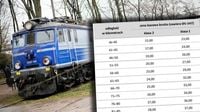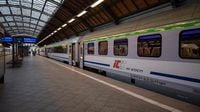As the Polish railway system navigates financial pressures, PKP Intercity, the country's primary long-distance train operator, is hinting at potential ticket price increases. Vice Minister of Infrastructure Piotr Malepszak recently acknowledged the need for fare adjustments, stating that "long-distance trains cannot be cheaper than local connections." This statement has raised eyebrows among passengers and local transport operators alike, suggesting that changes to ticket pricing may be imminent.
For years, ticket prices for PKP Intercity have remained stagnant, frozen at 2015 levels. Janusz Malinowski, the president of PKP Intercity, confirmed that "tariffs have not been changed for 10 years," indicating a growing disparity between the costs of long-distance and regional travel. In fact, on sections under 100 kilometers, PKP Intercity fares are significantly lower than those of regional carriers, sometimes by as much as 30 percent. This pricing strategy has drawn criticism from local transport operators, who argue that it creates an unfair competitive environment.
In the first quarter of 2025, PKP Intercity reported transporting nearly 18.4 million passengers, a 10 percent increase compared to the same period last year and a remarkable 34 percent rise from 2023. This surge in ridership can be attributed to several factors, including improved train schedules and the addition of new rolling stock. The company's recent performance also culminated in a record net profit of approximately 250 million PLN for 2024, further solidifying its position in the market.
Despite this success, the financial landscape is shifting. Vice President for Finance Dagmara Zawadzka highlighted a troubling trend: even with increasing passenger numbers, the real revenue per passenger has decreased by around 40 percent over the last decade. This decline is largely due to the unchanged ticket prices amid rising operational costs. As a result, the company is under pressure to recalibrate its pricing strategies to ensure sustainability.
Malepszak's comments about fare adjustments have not gone unnoticed. He pointed out that the current situation, where long-distance travel is cheaper than regional services, is unsustainable. "We will have to find a solution in the future," he noted, hinting that fare increases might be necessary. However, he reassured the public that any adjustments would not be drastic, aiming to balance the needs of the company with the interests of its passengers.
The notion of raising prices is not new. Earlier in 2023, PKP Intercity attempted to implement fare hikes, which resulted in ticket prices rising by several percent due to escalating energy costs. However, after public outcry, the government intervened, injecting 580 million PLN into the company to alleviate the financial strain and restore ticket prices to lower levels.
As PKP Intercity prepares for potential fare increases, local transport operators are voicing their concerns. Many of them have expressed dissatisfaction with the competitive edge that PKP Intercity holds, particularly on shorter routes. "It is not a healthy situation," Malinowski remarked, emphasizing the need for a more equitable market environment. This sentiment is echoed by regional transport providers who feel threatened by the allure of PKP Intercity's faster and cheaper services.
Moreover, the government has begun to receive letters from local authorities and transport operators urging a reconsideration of the pricing strategy. The disparity in ticket prices has led to an increase in passengers opting for longer-distance trains for shorter trips, further complicating the dynamics of the market. Malepszak noted that in the top twenty routes with the largest increases in passenger numbers, many are under 70 kilometers long. This trend underscores the shifting preferences of travelers, who are increasingly drawn to the convenience and affordability of PKP Intercity services.
Looking ahead, PKP Intercity has ambitious plans for modernization and expansion. The company aims to invest over 20 billion PLN by 2030, primarily in new rolling stock and infrastructure improvements. This investment is crucial for enhancing the quality of service and ensuring that the railway can compete effectively in the future. However, the financial implications of these investments will likely necessitate adjustments in ticket pricing.
As the situation unfolds, passengers are left wondering how these potential fare increases will impact their travel plans. While Malepszak assures that drastic changes are not on the horizon, the tone of discussions among railway officials suggests that adjustments are inevitable. With the balance between operational costs and passenger affordability hanging in the balance, the future of PKP Intercity's pricing strategy may soon become clearer.
In the meantime, as PKP Intercity continues to celebrate its record passenger numbers, the company faces the challenge of maintaining its growth while navigating the complexities of the railway market. The interplay between ticket pricing, service quality, and competition will be critical as the company seeks to retain its position as a leader in Poland's transportation sector.
For passengers, this may mean preparing for potential changes in ticket prices while hoping that the quality of service remains a top priority. As PKP Intercity moves forward, the railway's commitment to providing affordable and efficient travel will be tested against the backdrop of necessary financial adjustments.


